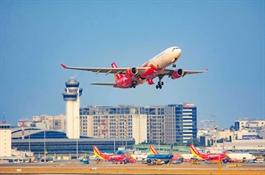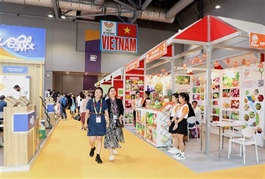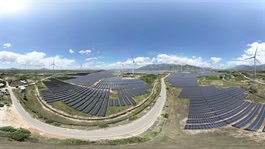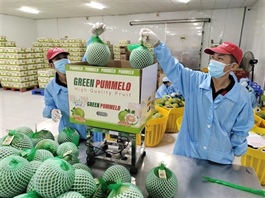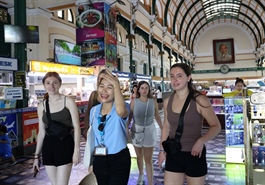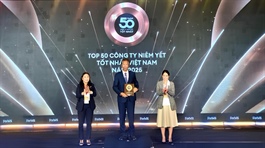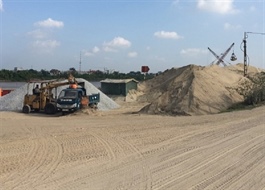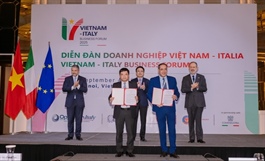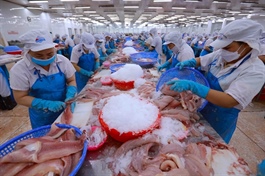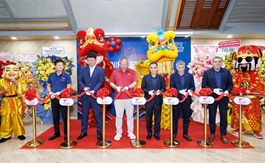PAN Group signs deal with Japanese partners to drive sustainable agriculture
PAN Group signs deal with Japanese partners to drive sustainable agriculture
The PAN Group has signed a cooperation agreement with Japanese partners AGRI SMILE and Mitsubishi Research Institute, Inc. to contribute to sustainable agriculture in Vietnam.
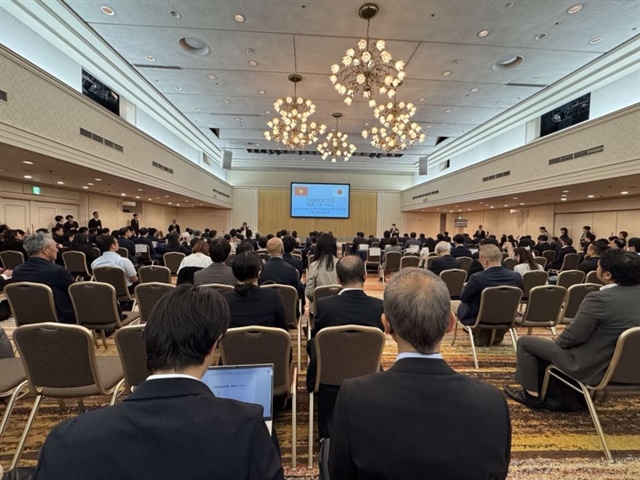
Acting Minister of Agriculture and Environment Tran Duc Thang (second from left) and representatives of The PAN Group, AGRI SMILE, and Mitsubishi Research Institute, Inc. at the signing ceremony |
This collaboration is one of 12 agreements signed by state management agencies and businesses of the two countries within the Vietnam-Japan Public-Private Partnership Forum, organised in Japan on September 4.
Under the agreement, the parties will jointly implement field trials on rice to evaluate the nutrient absorption and climate resilience of biostimulants developed by AGRI SMILE. In parallel, the parties will prepare regulatory registration and product distribution in the Vietnamese market.
Under the deal, the Vinaseed Research Institute under Vinaseed (VRI), a member of PAN, will play a key role in implementing an effectiveness test for biostimulants in Vietnam. With a research team of nearly 100 people and nearly 50,000 genetic resources, VRI aims to become the leading research organisation in the region in the fields of plant varieties and high-tech agriculture.
In addition, the MoU also opens up opportunities for long-term cooperation between VRI and Mitsubishi Research Institute, Inc. (MRI), in the context that MRI is a leading think tank in Japan, and a pioneer in driving innovation and sustainable development on a global scale, in which high-tech agriculture is a major priority.
Biostimulants are biological products applied to plants or soil to stimulate natural physiological processes, thereby enhancing nutrient uptake, stress tolerance (temperature, drought, salinity, pests, and diseases), productivity, and crop quality. Unlike traditional fertilisers, which supply nutrients directly, or pesticides, which control pests and diseases, biostimulants work by improving plant health and resilience. They are typically derived from natural sources such as seaweed extracts, amino acids, beneficial microbes, humic/fulvic acids, or recycled agricultural and food by-products.
As Vietnam seeks to reduce chemical fertilisers and pesticides while advancing green agriculture, biostimulants have emerged as a suitable and promising solution. They strengthen crop health, improve nutrient efficiency, and help plants withstand the increasing challenges of climate change, such as drought, salinity intrusion, and heat stress. Key crops like rice, maize, and vegetables stand to benefit significantly from their application.
At the same time, both domestic and international markets – particularly the EU, Japan, and the United States – are tightening standards on food safety, residue limits, and sustainability. Biostimulants help Vietnamese produce meet these requirements and maintain stable yields. As a relatively new field in Vietnam, biostimulants create opportunities for international cooperation in technology transfer, trials, and commercialisation – with Japan as a strategic partner.
With government policies encouraging organic and biological agriculture, biostimulants are well-positioned to become prioritised products for development, registration, and market expansion. This green technology is expected to play a vital role in reducing agrochemicals, increasing productivity, enhancing climate resilience, and meeting international standards – thereby strengthening the global competitiveness of Vietnamese agriculture.
Vietnam - Japan agricultural cooperation opportunities
Vietnam and Japan have significant potential to expand agricultural and food cooperation. Vietnam offers abundant and diverse agricultural and seafood supplies, while Japan has a high demand for safe, high-quality, and traceable food products. Japan’s ageing population, labour shortages in agriculture, and consumer preferences for healthy, sustainable food further reinforce these opportunities. In addition to direct exports, both countries can expand cooperation in deep processing, value-added product development, preservation technologies, and high-tech agriculture.

The forum attracted the participation of 100 businesses from Vietnam and Japan |
Acting Minister of Agriculture and Environment Tran Duc Thang shared five key targets that the two parties should focus on implementing to boost the agricultural sector.
The first thing is to expand agricultural trade cooperation. The two ministries will continue to promote the opening of each country's agricultural product markets, creating favourable conditions for agricultural, forestry, and fishery trade, for the benefit of producers and consumers of both countries.
Besides that, it is necessary to build a sustainable agricultural supply chain and bilateral investment linkages. Enterprises of the two countries can cooperate from production, processing, logistics, to distribution to reduce costs, improve quality, and meet the most stringent standards of the Japanese and international markets.
Developing green agriculture, reducing greenhouse gas emissions, and adapting to climate change are also important targets. This is an inevitable requirement for Vietnam in the roadmap towards the goal of net-zero emissions by 2050, and is also a priority of Japan within the ASEAN-Japan Green Cooperation Plan.
Furthermore, it needs to promote innovation, digital transformation, and agricultural mechanisation. Japan has leading strengths in technology, while Vietnam has a large market and high demand for production modernisation. This combination will create new value for both economies.
Improving the capacity of farmers and small- and medium-sized enterprises in agriculture is also a key target. This is the key force to realise all policies, so cooperation in training, knowledge transfer, and the formation of new cooperative models should be prioritised.
“The private sector’s cooperation plays an important role in catching these five targets. The two governments will continue to create favourable mechanisms, but it is the enterprises, associations, and cooperatives that are the direct forces to implement, innovate, and lead the market. Today’s forum is a testament to that determination, when the government and enterprises sit together to dialogue, share, and sign specific cooperation agreements,” Thang said.
“With the presence of nearly 100 businessmen from both countries at the event, I believe that the forum will open up many new cooperation opportunities, helping businesses to link in agricultural trade and investment, bringing practical benefits to the people, and to the comprehensive strategic partnership between Vietnam and Japan,” he said.
The PAN Group is a Vietnamese corporation in agriculture and food. Its portfolio includes major companies in agriculture, aquaculture, and packaged foods such as Vinaseed, VFC, Fimex, Aquatex Bentre, Bibica, Lafooco, and 584 Nha Trang.
Japan is a key strategic market and currently the largest export destination for The PAN Group. In 2024, the group achieved consolidated revenue of VND16.1 trillion ($650 million), with exports to Japan reaching nearly $100 million, accounting for 34 per cent of the group’s total export revenue.
- 12:02 05/09/2025




